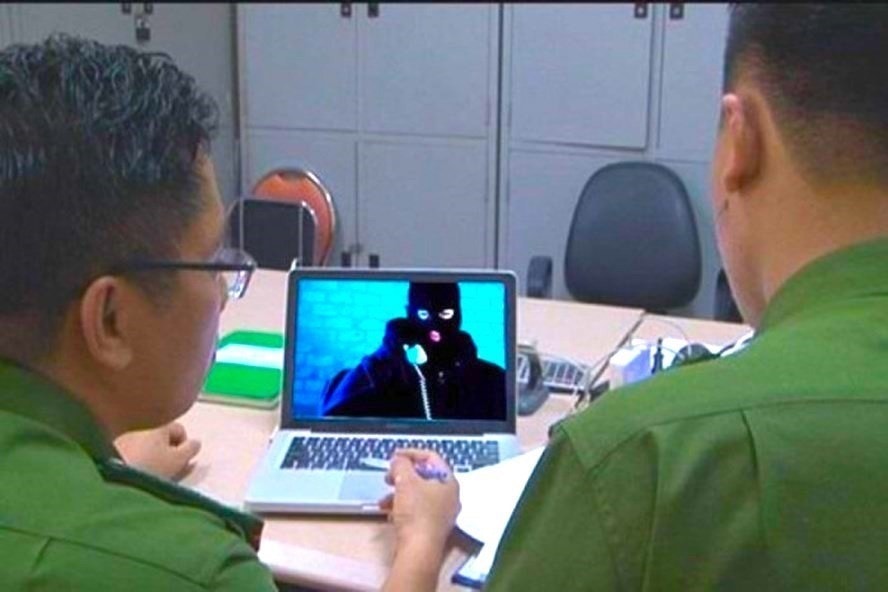Beware of Zalo and Facebook hacking tricks to borrow money
(Baonghean.vn) - Hacking Zalo to ask for money transfers, loans; transferring money by mistake and then demanding "exorbitant" interest; inviting people to earn money at home... are tricks of scammers targeting gullible people.
All kinds of tricks
In a state of frustration, Ms. PTD, a medical worker in Vinh City, said that on the afternoon of October 5, she received information that someone had impersonated her Zalo account to ask her friends to borrow money in a very sophisticated way.
According to Ms. D., this subject created a zalo account with her name, using her photo as the profile picture.CheatSomehow got a data package which is a list of phone numbers in the contact list. Then, made friends with the phone numbers in the above list. Next, the subject sent messages to chat and ask to borrow money...
Ms. D. said that in just over an hour, 2 people had transferred money, with an amount of 5.5 million VND. "When they saw something unusual, because I had never texted to borrow money like that before, they called me directly. At that time, when I checked the message history on Zalo, I was shocked, from my own Zalo, the subject had texted to ask to transfer money, to borrow money from nearly 10 people" - Ms. D said. According to Ms. D, "luckily, my friends called to inform me, so that I could promptly notify the bank to freeze the account, otherwise many people would have lost money to scammers."
 |
| Messages impersonating the Zalo account of Ms. PTD, a medical worker in Vinh City, asking to borrow money from friends. Photo: PV |
More sophisticatedly, there have been cases where some people have intentionally transferred money to the wrong account holder to force them into loan sharking networks. That is the case of Ms. NTT (residing in Nghi Xuan, Nghi Loc).
Ms. T. said that recently, after waking up at noon, she suddenly received 20 million VND transferred into her bank account along with a confusing attachment. While she was wondering who transferred it and what to do with this money, towards the end of the afternoon of the same day, a strange Zalo account added her as a friend and said that the finance company had disbursed a loan to her.
Shocked by the above notice and realizing that there were signs of fraud because she herself did not carry out any loan procedures, Ms. T. asked her family members who worked at the bank and proceeded to do the verification procedures.
 |
| One of the ads recruiting spelling proofreaders on social media. Photo: Internet |
It is worth mentioning that, in the context of the Covid-19 epidemic, grasping the common psychology of many people wanting to find a job to earn more income and ensure their lives, online job scammers have launched all kinds of tricks. More sophisticatedly, scammers also target the needs of young people, students who are on leave from school due to the epidemic and want to find extra work such as: watching videos, reading, proofreading, or writing product reviews... - light jobs, making quick money that many children have become victims of.
Student D.QT in Vinh City said: Through the introduction, just watch videos and read newspapers to check for spelling errors, about 2 hours a day can earn tens of millions of dong per month. Seeing that the job is easy and has a large source of income, T. quickly agreed to participate.
To start working, T. was asked to pay 250,000 VND to buy a step-by-step tutorial course. Then, the group manager provided an access link with an invitation code, which he used to refer others and receive commissions. However, after nearly a month, his income was only over 100,000 VND, but it could not be exchanged for cash or phone cards as promised in the initial recruitment. Every time he logged in, he saw his score increase, so he continued to log in. But later, he could not withdraw his money, and he realized he had been scammed.
Raise your vigilance
The Ministry of Public Security predicts that in the context of the complicated developments of the Covid-19 epidemic, many localities implementing social distancing... the crime situation, especially fraud and appropriation of property on the internet, will continue to develop complicatedly, tending to increase with many sophisticated and cunning tricks. Specifically, cases of hacking Zalo accounts or creating fake accounts by taking the victim's image, creating nicknames, and making friends have appeared for a long time.
Possible scenarios are: the scammer may have taken the victim's nick or simulated the victim's zalo account before; the scammer has controlled a cloud account of the victim; the scammer has installed an application/app on the victim's phone; the fake account is an acquaintance of the victim and is participating in a group with the victim and has all the common contacts in the group.
 |
| A Zalo owner in Hung Nguyen district was hacked and promptly posted a notice. Photo: PV |
Faced with the above situation, to avoid being scammed, the police agency recommends that when people receive loan requests via text messages, calls via Zalo, Facebook, they need to call back with a regular call to verify. At the same time, absolutely keep personal information confidential, do not provide personal information, phone number, home address, information about bank accounts, Internet service accounts... to any stranger who calls.
Regarding the method of mistakenly transferring money, according to an investigator of the Criminal Police Department of the Provincial Police, when an account owner receives a "mistakenly transferred" amount of money, first do not use that amount for personal expenses, and at the same time go directly to the bank branch to verify, and can also contact the police to resolve the matter.
Absolutely do not transfer money back to strangers without a third party witness, to avoid future troubles. At the same time, do not transfer money back to an account other than the one that was transferred to you, you must wait for the bank to resolve it first. In particular, never provide the OTP code, login name, password of the bank account to anyone, even if they claim to be relatives, friends, bank employees or authorities...
According to Nghe An Employment Service Center, online job recruitment activities cannot avoid fake information, difficult to assess job positions as well as job nature, and the risk of negative impacts on workers. Therefore, before posting job recruitment information online, workers need to carefully research the job before participating to avoid being cheated out of money and time.
 |
| Many scammers have been investigated by the police. Illustrative photo |
It can be seen that the Covid-19 epidemic is complicated, life is increasingly difficult and cramped. From here, many scammers have appeared, using many forms such as hacking Zalo to ask for money transfers, loans; transferring money by mistake and then demanding "exorbitant" interest; asking people to earn money at home... to target gullible people.
Therefore, according to Lieutenant Colonel Tran Duc Than - Head of the Criminal Police Department (Nghe An Provincial Police), along with recommendations from authorities, people need to be extremely vigilant. If they suspect signs of fraud, they need to immediately report to the police for handling./.





.jpg)


